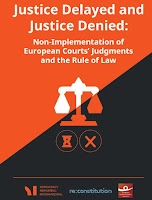The European Implementation Network (EIN) is calling on NGOs to express their interest to participate in a new project entitled 'Protecting Freedom of Expression by Supporting the Implementation of ECtHR judgments'. The project is aimed at protecting the right to free speech in every country in Europe where there is a ECtHR judgment pending implementation. Civil society will be provided with training, resources and mentoring in order to enable them to engage with the implementation process of the ECtHR judgments. The project will run for two years (
June 2023-May 2025).
Here is a description of the call:
'On 1st June, EIN launched a new project aimed at protecting freedom of expression by supporting ECtHR implementation, which will last for two years. The project aims at mapping ECtHR judgments pending implementation and NGOs working on freedom of expression, and helping them to use the ECtHR judgments implementation avenue to push for freedom of speech in Europe.
A two-day event will be organised in the second half of November (20-21 November, Mediencampus, Leipzig) for partners in the project. Activities will include assistance with drafting written submissions to the Council of Europe’s implementation monitoring process, and advice on advocacy best practices at national level to promote ECtHR implementation; briefings on cases concerning freedom of expression or media freedom to delegates of the Committee of Ministers of the Council of Europe; training and a conference to share lessons-learnt and best practices among stakeholders, and reporting on the overall state of implementation of ECtHR judgments concerning free speech.
EIN has a limited number of grants to allocate to NGOs committed to take part in our project.
Applications from NGOs which are specialized in the defense of freedom of expression but do not work yet on the implementation of ECtHR judgments are welcome. If your NGO already works on the implementation of FoE pending judgments, you might also benefit from our support. At this stage, if your organisation is interested in applying for a grant, we kindly ask you to fill in this form by the end of July.
Partners who will receive a grant from EIN in the frame of the project “Promoting Free Speech with European Judgments” will be considered Beneficiaries and will sign a subgrant agreement with EIN. For more information about the eligible activities, please see the Guidelines for beneficiaries.
The expertise of your organizations would be a valuable contribution to advocacy efforts for the implementation of ECHR judgments on free speech and can help turn judgments from the ECHR into real changes.'
More information about the project can be found here.









